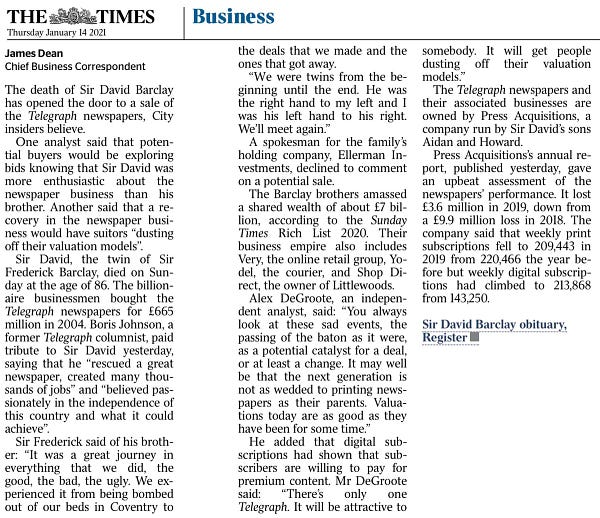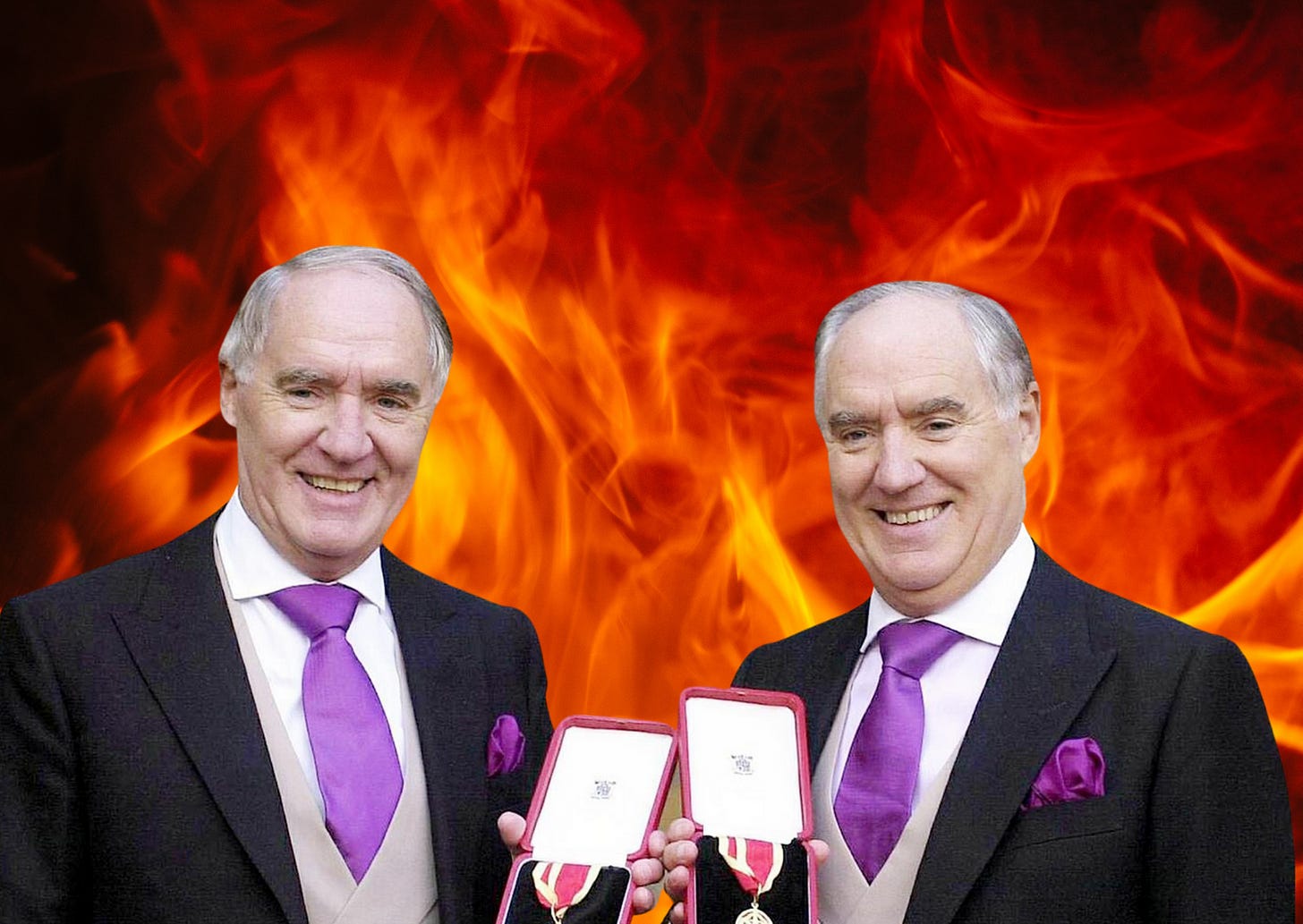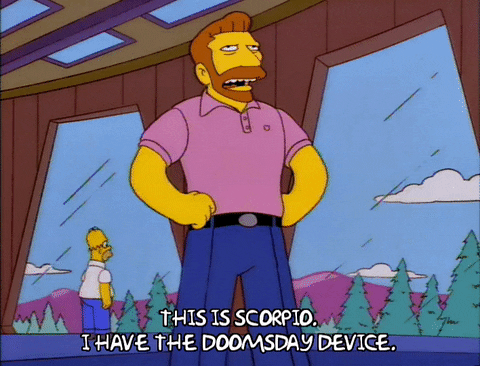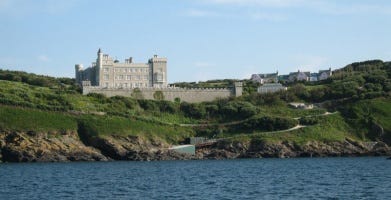Bye-bye, Barclay: Sir David Barclay is dead but the zombie Telegraph shambles on...
The obituaries have been coy. I won't be. A terrible twin has tottered off but the damage he did will last a long time.
Warning: This newsletter is aggressively “too soon”.
Sir David Barclay who, with his twin Frederick, sat above The Daily Telegraph and Sunday Telegraph like a barking right-wing Cerberus, defecating on the very concept of journalism, has died. He was 86.
If there was a hell, I suspect Barclay would currently be negotiating for a plot of its most exclusive real estate, persuading Satan to pay for a flattering supplement in the Telegraph, and trying to find Joseph Goebbels to chat about the secrets of his success.

Sir David Rowat Barclay was born on 27 October 1934. He was 10 minutes older than his identical twin brother Frederick, getting a head start in making the world worse. You may say, “Mic, he was just a baby!” but that underestimates the ability of the Barclay Brothers to make the world worse. Even as an infant, Barclay wondered how he could end up substantially richer and more evil than the next ‘baby’ — which he considered simply a synonym for someone rolling around in their own filth.
Last year’s Sunday Times Rich List — like an Argos catalogue of complete bastards — estimated the combined wealth of the Barclay Brothers at £7 billion. Whenever the pair were mentioned they were referred to as “reclusive” because it’s not polite to say “shifty” or “devious” when you’re discussing men who can buy lawyers by the crate.
Operating in retail, property, and the media, the Barclay Brothers’ businesses have been accused of tax avoidance, because they placed their assets under the ownership of companies registered abroad and controlled through trusts like people who are engaged in tax avoidance do. But you’d be a fool and a cad to say if it walks like a tax avoider, honks like a tax avoider, and builds its nest in the Channel Islands like a tax avoider that it’s a tax avoider. No, no, they were merely a pair of ducks who engaged in very prudent tax planning.
Despite the long-established Hank Scorpio rule that the blander the business name the more evil the company, the Barclays’ company Press Holdings owns Apollo magazine and The Spectator, while the equally very normally-named subsidiary Press Acquisitions Limited owns Telegraph Group Limited, parent company to the vile Daily Telegraph and Sunday Telegraph siblings.
In 1993, the Barclay brothers bought a tenement on the island of Brecqhou, a small sister island of Sark, one of the Channel Islands. They replaced the small house with a huge mock-Gothic castle, which features 100ft granite walls, battlements, two swimming pools, and a helicopter pad. Rumours that it also includes a death ray and a shark pit for dealing with wayward columnists are just rumours and should certainly not be spread around.
Over the years since they created their cosplay castle, the Barclays have been in almost constant battles with the government of Sark. The twins — imagine Walder Frey from Games of Thrones cloned in the chamber from The Fly — wanted to make Brecqhou politically independent and to install their own puppet politicians on Sark.
In the mid-90s, the Barclays — who later used their media empire to heavily lobby for Brexit — petitioned the European Court of Human Rights, to ensure they could leave the island equally to their four children. Sark simply changed its inheritance law to make that happen. In 2002, the Barclays claimed that they were paying too much property tax. Sark’s officials, fearing more legal action from the belligerent brothers cut their tax rate in the hope of a quiet life.
By 2008, the Barclays legal warfare against Sark led the island to take apart its feudal system of government that had been in place for the past 443 years. The first elections under a new system were held in December 2008 and… the Barclays tried to buy them. They failed and on 11 December 2008, the brothers pulled their investments on the islands — including hotels — making 170 staff redundant because Sark’s voters did not support the Barclays’ hand-picked candidates.
In 2012, the Sark lawfare battle made it onto the Today programme which reported that islanders were protesting against the Barclays’ bullying and intimidation tactics. A story pushed in a local paper owned by the Barclays accused the island’s doctor of negligence for transporting a patient by boat rather than the twins’ helicopter. Despite backing from the BMA and the patient’s family, the doctor was driven to leave by the Barclay Brothers attacks, which left islanders without healthcare.
By 2020, it seems the Barclay Twins had grown bored of fighting other people and had decided to fight each other. In February of last year, the High Court in London was told that Sir Frederick and his daughter Amanda had been secretly recorded for months by Sir David’s sons, Alistair, Aiden and Howard. They allegedly bugged the conservatory at the Ritz Hotel, which was owned by the Barclay brothers at the time.
Sir Frederick released CCTV footage of Alistair Barclay handling the alleged bugging device in the conservatory where the younger Barclay Brother liked to “conduct business meetings and smoke cigars”. Let’s take a little look at those businesses that Sir Fred was having meetings about…
In 1993, after a long and twisty history in business that stretched back to the 1950s, the Barclays bought brewing and shipping group, Ellerman, for £45 million. They later sold the brewing division for £240 million and later agreed to a management buyout of the shipping business. It was the start of a frequent Barclays strategy — buying up companies, smashing them up, and making a profit from their real estate holdings.
The Ellerman deal also offers a classic example of the Barclays copper-bottomed shittery. The brothers approached a non-executive director of Ellerman, David Scott, in a secret Monte Carlo meeting. They told him they wanted an exclusive option to buy the company and, if he kept it secret, he could stay on as chairman. Scott made it happen and… moments after signing over the company he was handed a letter by the Barclays’ lawyer telling he was required to resign immediately as he’d been indiscreet.
In 2002, the Barclays gobbled up Littlewoods, merging the company with an earlier purchase — Shop Direct — to form the clunkily-named Littlewoods Shop Direct Home Shopping Limited. They closed and sold off the Littlewoods department store chain, raking in more cash from selling real estate to the owners of Primark and setting themselves up as the high street landlords of many M&S, New Look, and BHS stores. In 2004, the Barclays sued HMRC for £1 billion. Littlewoods had raked back almost £500 million in overpaid VAT (and simple interest) but the Barclays argued they were owed compounded interest.
As you might expect, the biggest bastards in British media also own the biggest bastards among British delivery companies — Yodel.
In 2006, they sold Handbag.com — a collection of four websites for women — for £22 million. It was almost all profit but almost coins found behind the sofa for the billionaire brothers. In 2009, they bought up the Woolworths and Ladybird brands, sticking them in Shop Direct’s IP vault for future use.


The twins, despite their constant insistence on their own privacy, became newspaper ‘barons’ in 1992 when they bought The European, a weekly paper that had previously been part of Robert Maxwell’s holdings. It was shuttered in 1998. In 1995, they went higher-end by buying The Scotsman and parachuting in former Sunday Times editor and future BBC politics ‘big beast’ Andrew Neil to edit it. 10 years later, they sold The Scotsman Publications Ltd to Johnston Press for £160 million. Like a bad football team, The Scotsman had seven editors in nine years under the Barclays’ stewardship.
In July 2004, the Barclays finally bought The Telegraph Group — now Telegraph Media Group — after months of their favourite sports bidding, lawsuits, and ugly recriminations. In February 2004, a judge in one of the legal cases leading up to the sale of The Telegraph Group accused the Barclay brothers of being “less than fully candid” and went on to say that they had “remained silent while Lord Black [the Telegraph’s then owner] misled [his] board”. David Barclay grumbled that the criticisms were “grossly unfair”.
While their property empire bubbled away, keeping them in the billionaire boys club, the Barclays’ ownership of the Telegraph Group has been horrendous. In 2005, The Sunday Telegraph editor Dominic Lawson was shit-canned and replaced with future Today programme editor Sarah Sands. She lasted for 9 months. In 2006, the twins’ handpicked CEO, Murdoch MacLennan, made 100+ journalists redundant. That same year Patience Wheatcroft was made editor. She was replaced a year later.
By February 2015, the distorted editorial direction had become so obvious that Peter Oborne, the paper’s Chief Political Correspondent, resigned in protest. He wrote:
Circulation was falling fast when I joined the paper in September 2010, and I suspect this panicked the owners. Waves of sackings started, and the management made it plain that it believed the future of the British press to be digital. Murdoch MacLennan, the chief executive, invited me to lunch at the Goring Hotel near Buckingham Palace, where Telegraph executives like to do their business. I urged him not to take the newspaper itself for granted, pointing out that it still had a very healthy circulation of more than half a million. I added that our readers were loyal, that the paper was still very profitable and that the owners had no right to destroy it.
The sackings continued. A little while later I met Mr MacLennan by chance in the queue of mourners outside Margaret Thatcher’s funeral and once again urged him not to take Telegraph readers for granted. He replied: “You don’t know what you are fucking talking about.”
Events at the Telegraph became more and more dismaying. In January 2014 the editor, Tony Gallagher, was fired. He had been an excellent editor, well respected by staff. Mr Gallagher was replaced by an American called Jason Seiken, who took up a position called ‘Head of Content.’ In the 81 years between 1923 and 2004 the Telegraph had six editors, all of them towering figures: Arthur Watson, Colin Coote, Maurice Green, Bill Deedes, Max Hastings and Charles Moore. Since the Barclay Brothers purchased the paper 11 years ago there have been roughly six more, though it is hard to be certain since with the arrival of Mr Seiken the title of editor was abolished, then replaced by a Head of Content (Monday to Friday). There were three editors (or Heads of Content) in 2014 alone.
The final straw for Oborne was discovering that The Telegraph was memory-holing coverage critical of HSBC, a major advertiser.
In 2014, when Jason Seiken — a boiled egg filled with half-digested management books — was brought in to do whatever digital magic he had sold the executives on, I was a low-paid freelance contributor to the Telegraph Blogs section. My nominal role was to write tech stuff but I soon moved into writing more general political contributions with a melty centre-left perspective. Back then it was still deemed important that The Telegraph at least pretend to host varied views.
In early-2015, I ‘resigned’ when I was falsely accused of plagiarism (something I’d written had relied on the same deposition as a report written by another outlet, and I was later exonerated) but my editor rejected the resignation. He was told to accept it by Seiken — who had never met me — because, despite my stories getting very high page view numbers, I seemed like too much trouble. After 18 months of fucking things up, Seiken was binned in April 2015.
Over the next five years, through the Brexit wars, The Telegraph became increasingly unhinged. Where once it had been a clearly right-wing paper with at least a tenuous grasp on the facts, it had become a fanzine for the far-right. Bored with being newspaper owners and having to pour their money into a loss-making scandal sheet, the Barclays announced their intention to sell the Telegraph group in October 2019.
Now, David Barclay is dead. Among his estate — so The Daily Mail obit claims — he leaves a library of all the legal actions he pursued in his life. And while he and his brother received their knighthood for “services to charity”, his true legacy lies in his lawfare against the people of Sark and his newspapers’ commitment to lies, distortions and deception.


David Barclay has not lived to see what the Brexit he so desperately wanted will bring nor to witness the final collapse of The Telegraph, a paper whose foundations he and his twin chipped away year after year, paid supplement after supplement about the Saudi regime or the Chinese government, and favour after favour for advertisers.
There is a telling section in The Telegraph’s own Pravdaish obituary; it reads:
Sir David had an astute grasp of the political landscape and one friend recalled that he was “able to read the economic ‘tea-leaves’ like few people of his generation”. But as newspaper proprietors, it had always been the brothers’ policy to intervene barely at all in editorial decisions – though their editors knew that they supported Margaret Thatcher’s enthusiasm for small government, free markets, lower taxes, wealth creation and providing the means of social mobility to everyone.
Yes. Editors didn’t need to be told what Sir David wanted. They knew and obliged. Those that refused didn’t last long.





